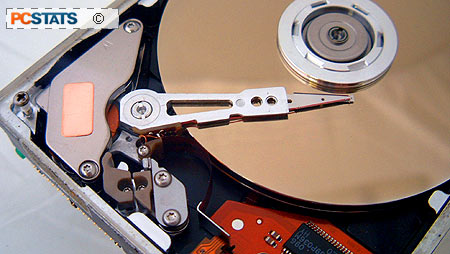A hard disk drive is composed of one or more
platters, spinning disks containing tracks of magnetic information. These platters are read by
read/write heads that hover just above the surface of the disk on a cushion of
air created by the speed of the platter's rotation. These
heads are attached to an armature that can move them over the surface of the
disk, powered by a magnetic 'voice coil'.
The whole
assembly moves incredibly quickly and precisely. The platters generally rotate
at either 5400 or 7200 RPM, and the movement of the read/write heads to separate
areas of the disk is almost instantaneous.
Hard disks will fail
eventually because they are mechanical devices, and as such, wear out. It's as simple
as that. The most likely reason for a drive to fail before its time, however,
is physical damage. If a drive is bumped or jostled while it is active (meaning
that the read-write heads are busy reading or writing data on the surface
of the platters) there is a chance that the heads will make contact with the
surface of the platter, which can cause all sorts of problems.
 This 'head-crash' can cause
damage both to the read heads and the surface of the platter, can knock the
read-heads out of proper alignment, and a host of other badness.
This 'head-crash' can cause
damage both to the read heads and the surface of the platter, can knock the
read-heads out of proper alignment, and a host of other badness.
Fortunately, modern drives are
well protected against this kind of damage while the heads are in motion.
All hard drives manufactured in the last decade or so protect themselves automatically
when the drive spins down by parking the read-write heads, or lowering
them onto a safe area on the surface of the stopped platter.
A stopped drive is extremely difficult to damage by physical means. For this
reason, you should avoid moving your computer around while it is powered on.
Obviously, most laptop hard disks are better protected than standard 3-½ inch
desktop hard drives, but they can still be affected by physical force.
The electric motor that powers
the platter's rotation is also subject to failure over a long period of use. A
failure in the drive's motor or bearings can cause slow performance or data
read/write errors due to the platters spinning up slowly or rotating at an
incorrect speed.
Hard drives contain filtered
air-intakes, to provide the internal atmosphere needed to keep the read/write
heads hovering above the surface of the disk. A failure in the filtering can
allow particles into the drive mechanism, which can quickly cause great damage
to your data.
Any mechanical failure of the
disk, or physical damage inflicted to it will almost certainly cause attendant
software problems, generally due to bad sectors.

